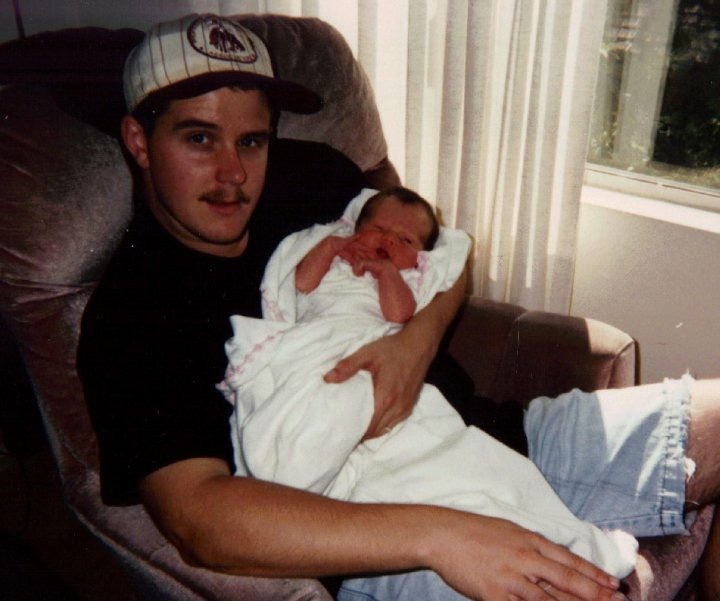Children highly impacted by paternal absences
By Katie Ward
For the first months of my life, my father was set for an eight-month deployment overseas that would result in him missing the “firsts” of my early life — walking, forming gibberish into words, birthdays — missing building those initial bonds as a family.
This was not an uncommon event for the majority of my friends and acquaintances growing up.
Living in a predominantly military town, most of us had grown used to our parents’ absences, waiting for the days when they would return after months or even years of deployment.
As most of us became accustomed to this lifestyle of having our families being separated, it didn’t hit me until I was leaving for college how little my father and I really knew one another.

Ward, as a newborn, and her father in 1995, home together for the first time.
I know I cannot be the only child, military or otherwise, that has felt the effects of missing time together with their father, or of sharing the memories and relationships that are so crucial to the development of building not only the life of a child, but of a family as well.
As of now, the United States is the only developed nation, out of 70 countries, that does not mandate some sort of paid paternity leave.
Other countries, such as Estonia, Japan, Austria, Hungary, Norway and Bulgaria, offer more than a year and a half paid leave for new fathers.
Clearly, we have a lot to learn.
The Family and Medical Leave Act (FMLA) does cover about half of American workers with guaranteed 12 weeks of paternity leave, but most of that time is unpaid.
While the majority of the states have some law that requires this time off, working fathers are rarely privileged with this opportunity.
Those who are given the time-off to be home with their newborn often suffer from health, financial and career repercussions due to the unpaid leave.
One of the most significant moments in life, for most, is becoming a parent.
But while being a parent can be a lifetime commitment, the experience of being one is never more palpable than the first few days and months after the child’s arrival.
In most countries, a social-security type system is set to fund the full paid time-off for employees, although in some nations, these employees have to foot part of the bill while on leave.
While the United States is the only country that does not uphold a national paid leave for workers, California, New Jersey and Rhode Island have all created state-mandated paid leave plans.
California is even providing paid time-off in cases regarding child, spouse or immediate family member illness care.

The reasons for extending leaves for new fathers are numerous, but often reflect consistent values we all as humans desire: greater gender equity, reflections in the ever changing roles of men and women within a family, and allowing fathers to be more present in their child’s early life.
Lawrence Balter, a parenting expert and professor emeritus of applied psychology at New York University, strongly supports the importance for fathers to spend substantial time with their newborns, stating, “Naturally, it’s important for fathers to develop a strong connection and attachment to their babies.
“There is a lot of research that says a father’s role in the child’s life is very significant.”
Earlier, more intense engagement of both parents with their newborns can be keen in developing not only strong relationships, but also in providing influences and positive long-term effects between parents and children, an experience fathers often have to miss out on or minimize.
With my father gone usually between six months to a year during each year of my life, my mother, who worked full-time, became my biggest confidant and most influential parent.
Every time my father came home, I was always a completely new person in his eyes.
I will always remember the night my mother and I went to pick my father up at the naval airport after his six-month deployment in Japan.
I was 5 at the time, and really hadn’t begun to process the role these long-term separations would play into our relationship.
As the plane landed and each man and woman exited the plane in a single line, I could not recognize where my father was.
The man who had left, the one who was relatively skinny, pale man with a full head of hair that I remembered, had changed.
Instead the man who approached my mother and I had a beard, a cleanly shaved head and mounds of muscle so large that when he hugged me, suffocated me.
I could not stop crying and refused to believe this was my father, the same man who I remembered leaving.

Since January, 2016, the Pentagon has granted 12 continuous weeks of paid maternity leave for all uniformed service members, while granting only six to 10 weeks of paternity leave.
For eighteen years, I was unable to build a bond with my father, but there is still hope for further generations in providing the equitable paid leave that both parents deserve.
It’s time that families are allowed this significant time off, if not for the parents, then for the future of the children who are highly affected by the lack of involvement of their fathers in their early lives.
Katie is a senior studying communications.

















































































